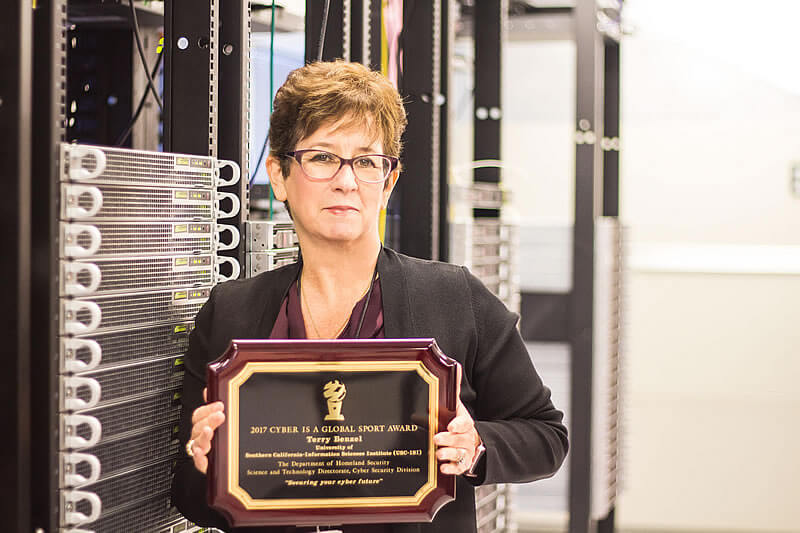
ISI’s Terry Benzel, pictured with the Cyber is a Global Sport Award
Cyberwar knows no geographic boundaries, but neither does ISI’s award-winning Cyber Defense Technology Experimental Research (DETER) group.
On July 13, 2017, the DETER group received the Department of Homeland Security’s Cyber is a Global Sport Award at the 2017 Cyber Security Research and Development Showcase in Washington, D.C.
The award recognizes the DETER partners program, which helps organizations worldwide build and maintain testbed infrastructure modeled on the group’s acclaimed DETERLab facility.
An ecosystem of knowledge-sharing
Powered by 700 computers in ISI’s Marina del Rey campus, DETERLab is an emulation of the Internet offering business, government and university researchers a controlled environment to test and assess cybersecurity solutions.
Since its launch in 2003, more than 10,000 users worldwide, including 104 universities from 25 countries, have used DETERLab for cybersecurity experimentation, investigating ideas to stop spam, phishing, botnets and more.
Buoyed by this success, in 2013 DETER established a partners program to create an ecosystem of worldwide knowledge-sharing aimed at defeating cybercriminals.
“Cybersecurity is a nonpartisan issue,” says the team’s project leader Terry Benzel, deputy director of ISI’s Internet and Networked Systems Division and an internationally recognized cybersecurity expert who has twice testified before Congress.
“We provide our software, support and advice to help partners build a DETER cluster in their countries, which they can then customize and extend for different research areas,” says Benzel.
“Importantly, the DETER-based development environment is structured so that partners can contribute their extensions and tools back to the master DETER system.”
Changing the asymmetric warfare
As cybersecurity threats mount across the world — from data breaches to ransomware and even allegation of elections hacking — cyberwar can no longer be dealt with by one country alone.
“Cybersecurity is a non-partisan issue,” says Benzel.
“The ‘bad guys’ have the whole world as a testbed. If we have any hope of changing this asymmetric warfare, we need to offer experimental testing capabilities for researchers across national boundaries.”
DETER’s international partners now include the National University of Singapore, the Israel National Cyber Bureau, the European Union Joint Research Centre, and Defence Research and Development Canada.
The ultimate goal is to create a worldwide set of interconnected networks that can coordinate experimentation and share data.
“This project is about stopping tomorrow’s threats before they start,” says Benzel.
Recognition of international collaboration
The DETER team, comprising 15 ISI researchers and engineers, and a team at the University of California, Berkeley, received one of five awards presented to outstanding cybersecurity organizations at the 2017 Cyber Security Research and Development Showcase.
More than 850 universities, businesses, national labs and government agencies from the U.S. and beyond attended the three-day event — the federal government’s largest cybersecurity conference.
Benzel, who also gave a presentation entitled Building Beyond DETER: Toward the Future of Cyber Experimentation with Advanced DETERLab Technologies, accepted the award on behalf of the DETER team.
She singled out the contributions of ISI research engineer Goran Scuric, who has traveled widely to work with international partners and provide software distribution support.
“I think the recognition of the importance of international collaboration is critical in the fight against cyberwar,” says Benzel.
“For the US government to recognize that you can’t solve this problem alone sets a good example for the future of cybersecurity.”
Published on July 25th, 2017
Last updated on June 2nd, 2021












